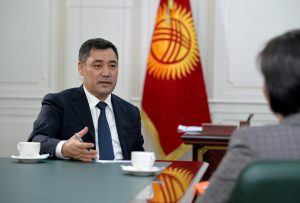Temirov Live, an investigative outlet and an Organized Crime and Corruption Reporting Project (OCCRP) member center, was investigating projects under the Kyrgyz Presidential Administrative Directorate when it was effectively shut down earlier this year, its employees jailed after a January raid. The raid came after years of pressure on Temirov Live that had peaked in November 2022 with its leader Bolot Temirov’s deportation after his being stripped of Kyrgyz citizenship (and that came after an ultimately failed effort to lock him up on drugs charges).
Curiously, each wave of pressure coincided with a new investigation by the outlet, often highlighting allegations of corruption linked to the government, families, and networks of President Sadyr Japarov and his security chief, Kamchybek Tashiev.
A newly released investigation conducted by OCCRP, in partnership with Temirov Live and another beleaguered independent Kyrgyz outlet, Kloop – titled “All the President’s Men” in OCCRP’s version and “The Khan’s Entire Army” by Kloop – proclaims in its introductory overview: “Now, we’re going to finish the work of those who can longer do journalism in Kyrgyzstan.”
The report alleges that dramatic changes made in April 2022 to Kyrgyzstan’s Law on Public Procurement, which allow state-owned enterprises to bypass tender procedures, decreased transparency in public spending and dovetailed with an ambitious series of state projects – projects that the reporters say “are being implemented by companies owned by people who appear to be close to the president himself.”
Since Japarov took power following the October 2020 revolution – before which he was serving a jail sentence – the president has centralized power in his administration’s hands, couching this power-grab as both increasing efficiency and as an effective anti-corruption effort. Japarov likes to take “personal control” of important projects.
The Presidential Administrative Directorate seems to be at the center of this effort, though arguably it has neither brought efficiency nor eliminated corruption. The directorate’s purpose is ostensibly to provide “financial, material-technical, transportation, social, recreational and medical support” to the president, but its remit has clearly expanded.
In the new investigation, the reporters identified at least 11 major projects initiated by the Japarov government being managed by the directorate – six of which come with a price tag of $137 million. “It was impossible to determine how much the government was spending on the other five,” the report said, noting increasingly scarce official procurement data and a lack of open records.
The reporters also found a network of five companies given contracts for the projects that all appear to be tied back to Japarov or the head of the Presidential Administrative Directorate, Kanybek Tumanbayev.
“There is no definitive evidence that Japarov has anything to do with the five companies, but the firms all have multiple connections to his family members and the head of his Presidential Administrative Directorate, raising serious questions about how he is allocating the contracts for major state projects — especially given Kyrgyzstan’s newfound lack of transparency,” the report stated.
One example: Module House engaged in work on several state projects, including building guest houses at Ala-Archa National Park and reconstructing the Jyrgalan resort in Issyk-Kul. The company was established by a former classmate of Tumanbayev who, the reporters note, had no other business interests. The company was then transferred to Elaman Toktobekov – a 24-year old rapper and a friend of the president’s son. A person named Kochkorbek Zhumanazarov was “identified by multiple sources as a person who helped Tumanbayev operate his businesses.” Zhumanazarov has been identified as the or co-owner of multiple companies tied to Tumanbayev by the investigation; he was also the director of a burger restaurant owned by Tumanbayev’s family.
Social media provided critical clues in lieu of official records. In a TikTok video, construction workers at the Jyrgalan resort addressed Japarov directly with complaints that they hadn’t been paid: “They continue to deceive us. What kind of firm this is… We can’t reach its management.”
The investigation notes that it’s not just the public who can’t figure out who is managing these state projects; it’s the government itself. When a decree was unexpectedly posted online in August 2023 revealed that the company building the new Presidential Palace would receive three plots of land in the south of Bishkek, Radio Azattyk reported the estimated value of the land at $77 million. Reacting to the news, Dastan Bekeshev, a notably outspoken member of parliament, posted online: “[We] still don’t know how much money was taken from the budget to begin the construction… [but] you might have a heart attack… For your own health, information about the actual expenditure on the construction of the Presidential Palace is classified.”
This most recent OCCRP, Temirov Live, and Kloop investigation is yet another glimpse into the ways informal networks have hollowed out the Kyrgyz state.
In the May issue of The Diplomat Magazine, Aksana Ismailbekova argued that the strength of the Japarov-Tashiev tandem is rooted in “its ability to accumulate money and use that money to secure power, and not just by simple bribery.”
Ismailbekova went on to explain:
Money plays a crucial role in the political system of Kyrgyzstan, as it enables Japarov and Tashiev to centralize power in their hands. Money – metaphorically speaking – has become the “heart” of Japarov and Tashiev’s tandem. Money allows them to carry on strengthening their authoritarian aims, and money may enable them to stay in the power for a long time.
“Of course” – this is what my interviewees all say when I ask them whether Japarov and Tashiev are amassing wealth, and if money is at the core of their tandem. “Of course they are.” Of course it is.
Eliminating transparency mechanisms – like open tenders for state-funded projects and independent journalism – is arguably a necessary step to protect that wealth.
You can read the OCCRP, Temirov Live and Kloop investigation in English, Russian, and Kyrgyz.

































